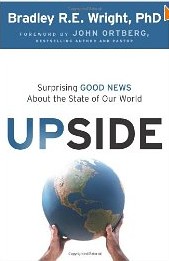 “The trouble with this country is that there are too many people going about saying, ‘the trouble with this country is…'” – Sinclair Lewis.
“The trouble with this country is that there are too many people going about saying, ‘the trouble with this country is…'” – Sinclair Lewis.
This is how Bradley Wright’s new book, Upside: Surprising Good News about the State of Our World begins. Wright, a sociology professor at University of Connecticut, argues that things aren’t is bad as we think they are. He believes pessimism is out of control: “We all know where we’re going, and we’ll arrive there in a hand basket” (p. 16).
Wright’s previous book, Christians Are Hate-Filled Hypocrites…and Other Lies You’ve Been Told, was basically the cover story of Christianity Today in July 2011. See http://www.christianitytoday.com/ct/2011/august/americans-do-like-evangelicals.html.
Upside has something for everyone, statistics for the academics, stories for people bored by statistics, and humor for people bored by statistics and stories. (If you thought God Behaving Badly was too silly, you may not appreciate Wright’s humor.)
After an introduction (ch. 1) and a discussion of why we think things are bad (ch. 2), Wright looks at the major topics where he perceives people to be too pessimistic: finances (ch. 3), education (ch. 4), health (ch. 5), happiness (ch. 6), crime (ch. 7), marriage (ch. 8), environment (ch. 9). He conclusion offers some practical next steps (ch. 10).
Why do we think things are bad? Wright sees a combinations of factors including: the media (bad news sells), advocates (a crisis brings in donations), bad statistics (basically modified urban legends) and nostalgia (how sweet it isn’t any more).
The carrot and the stick. I think Wright is more of a carrot person, as is my wife Shannon. Carrot people are motivated by the positive. (Our dog is total carrot canine. He does tricks for carrots.)
I’m a stick person. I converted because I wanted to avoid hell. To be honest, I think I’m going to have difficulty with Wright’s thesis because I know what I need to get motivated, and it’s usually bad news. But many people will get depressed or discouraged by worst case scenarios, and Wright makes a strong case that many of the things we think are bad, aren’t as bad as we think they are. (My adjective for my Stanford application was “optimistic”– but dark scenarios still motivate me.)
I hope you’re looking forward optimistically to a few more blog posts on Upside. The outlook is good.
How are you motivated? Are you more of a carrot or a stick person?
